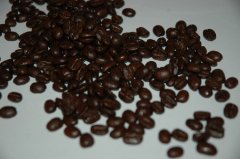Boutique Coffee recommends Jamaica's Top Blue Mountain Coffee (2)
At a Blue Mountain coffee processing plant for tourists, the commentator revealed to reporters the "secret" of why Blue Mountain coffee tastes pure: their coffee trees are all on rugged hillsides, and the picking process is very difficult. Non-local skilled female workers are simply incompetent. It is very important to choose the right ripe coffee beans when picking. Immaturity or ripeness will affect the quality of the coffee. The picked coffee beans are shelled on the same day, and then let them ferment for 18 hours. After that, the coffee beans were cleaned and screened. The subsequent process is to dry, which must be carried out on the cement floor or on a thick blanket until the humidity of the coffee beans drops to 12% 14%. And then store it in a special warehouse. Take it out and roast when needed, then grind it into powder. These procedures must be strictly mastered, otherwise, the quality of coffee will be affected.
Blue Mountain Coffee can maintain its top status today, which is also related to the local government's policy of limiting production and ensuring quality. Jamaica is not famous for Blue Mountain Coffee, regardless of the quality of mass production. But to give priority to quality, would rather sacrifice output, but also to protect the blue mountain coffee this gold-lettered signboard. Brazil, the world's largest coffee producer, produces 30 million bags (60 kg each) of coffee a year, while Jamaica produces just over 40, 000 bags a year. This shows the difference in output.
Blue Mountain coffee beans are divided into several kinds according to their quality. the top blue mountain coffee beans generally do not enter the circulation market, and most of them are booked by the royal family and tycoons. The Blue Mountain coffee beans on the market are "Blue Mountain" beans guaranteed by the Jamaican government. Statistics from the Coffee International website show that in 2003-2004, Jamaica produced 43000 bags of coffee, of which 24000 bags were exported. Nearly 90 per cent of exports go to Japan and the rest to Europe and the US. Because the output is limited and the export volume is not large, Blue Mountain coffee has been in short supply in the international market. As the saying goes, blue mountain coffee is expensive even in its place of origin, with a 4-ounce (114-gram) bag of blue mountain coffee selling for nearly $7 on the Jamaican market.
In recent years, all kinds of coffee shops in China have sprung up like bamboo shoots after a spring rain, and top Blue Mountain coffee has naturally become the target pursued by people, especially young people. For a moment, it seems that only after tasting Blue Mountain Coffee can you really drink coffee. And if you don't sell Blue Mountain Coffee, it's not a real coffee shop. The price of each cup of "Blue Mountain Coffee" in China ranges from more than 30 yuan to more than 100 yuan, which is really expensive. Of course, if it is the real thing, the above price is also in line with the valuable status of Blue Mountain Coffee. However, the output and export volume of Jamaican Blue Mountain Coffee is limited, China does not import Blue Mountain Coffee directly from Jamaica, and the International Coffee Organization has no record of exporting Blue Mountain coffee beans to China. In addition, it is believed that most domestic coffee lovers do not have the ability to distinguish between different quality coffee. So remind people to beware: although you pay a high price, the coffee in your cup is probably not the real Blue Mountain coffee.
Jamaicans insist on using the ancient method to treat coffee beans to ensure the quality of coffee.
Important Notice :
前街咖啡 FrontStreet Coffee has moved to new addredd:
FrontStreet Coffee Address: 315,Donghua East Road,GuangZhou
Tel:020 38364473
- Prev

Boutique Coffee recommends Jamaica's top blue mountain coffee
I have heard that Jamaica's Blue Mountain Coffee is famous all over the world and has been longing for it for a long time. Not long ago, I took the opportunity of an interview with this Caribbean island country to specially appreciate the strong and honest aroma of Blue Mountain Coffee and put an end to a long-cherished wish in my heart. Take a bus from Kingston and follow the winding mountain road to Strawberry Villa, a famous scenic spot in the Blue Mountains. Enjoying the mountain scenery in front of us and the sea view in the distance
- Next

El Salvador Coffee Renas Manor Coffee beans
El Salvador Renas Manor (EL Salvador Natura Las Ranas) Variety: Arabica (Arabica) Comprehensive Coffee Origin: EL Salvador El Salvador location: northern Central America elevation: 1400-1780m palate: smooth in the mouth, obvious sour flavor: wild olive introduction: high-quality very hard beans grown in a special rainforest climate.
Related
- Beginners will see the "Coffee pull flower" guide!
- What is the difference between ice blog purified milk and ordinary milk coffee?
- Why is the Philippines the largest producer of crops in Liberia?
- For coffee extraction, should the fine powder be retained?
- How does extracted espresso fill pressed powder? How much strength does it take to press the powder?
- How to make jasmine cold extract coffee? Is the jasmine + latte good?
- Will this little toy really make the coffee taste better? How does Lily Drip affect coffee extraction?
- Will the action of slapping the filter cup also affect coffee extraction?
- What's the difference between powder-to-water ratio and powder-to-liquid ratio?
- What is the Ethiopian local species? What does it have to do with Heirloom native species?

